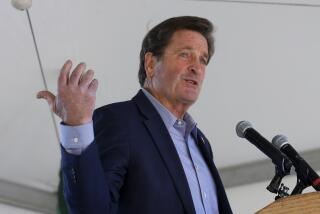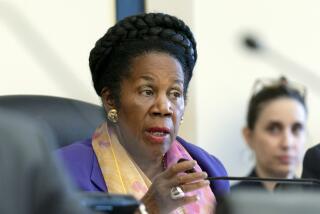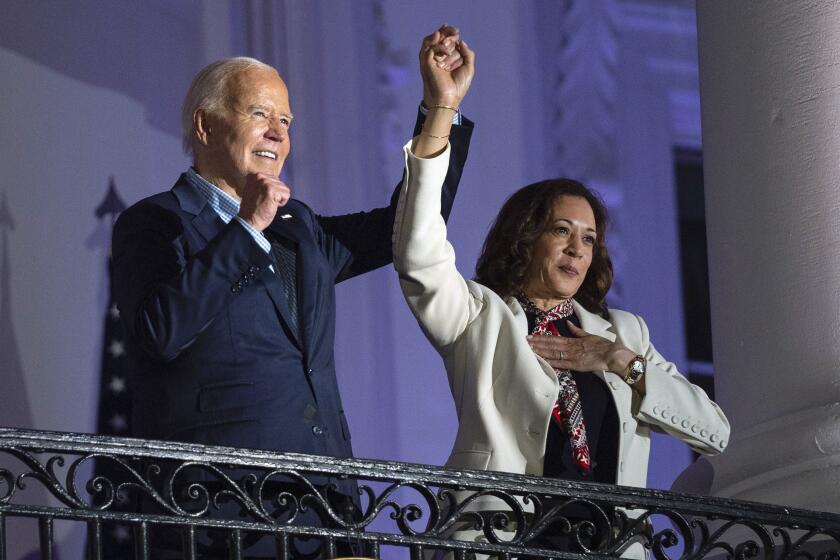Bradley Seeks Heart Disorder Treatment
Bill Bradley abruptly veered off the campaign trail Friday to seek treatment for an irregular heartbeat, a condition first diagnosed in 1996. Aides minimized the incident, saying the Democratic presidential candidate would resume his schedule after a day’s rest.
The 56-year-old former professional basketball star, who first experienced discomfort Thursday night, canceled an afternoon appearance at the Berkeley Marina. By the time Bradley arrived at a hospital, his heart had “converted to a normal heart rhythm and no therapeutic action was needed,” said the physician who examined him, Ed Anderson, in a statement released by the campaign.
The campaign also released a letter from Bradley’s personal physician, written Thursday, detailing the results of a Dec. 3 examination in which the doctor noted Bradley’s condition and a medication he has been using to treat it. The letter stated that the former senator from New Jersey had “no structural heart disease.”
“Thus, this rhythm does not in any way interfere with your ability to function,” wrote Dr. Robert H. Heissenbuttel.
Still, from a political standpoint, most observers agreed Friday’s incident was not helpful, to say the least.
“Obviously it’s a story you’d rather not have to deal with,” said Paul Maslin, a Democratic pollster who is neutral in the party’s contest. “You don’t need any doubts going on, particularly when you’re a challenger and it’s an uphill fight to begin with.
“While it could mean very little, it could also raise questions in people’s minds about his fitness for the job.”
Campaign officials said Bradley started feeling “mild discomfort” Thursday night in Sacramento after he arrived from an event in Los Angeles. Bradley spoke at a Friday morning news conference on the steps of the state Capitol, then decided about midday to seek treatment after he attended a Berkeley fund-raiser. Meanwhile, about 200 Berkeley supporters and roughly two dozen reporters who had gathered for an environmental news conference were left standing on a grassy hillside overlooking the sparkling marina.
“His spirits are good,” Eric Hauser, a spokesman for the Bradley campaign, declared hours later. “He knew what this condition is. He’s handled it, and he’s in excellent shape. On we go.”
About 2 million Americans have an atrial fibrillation disorder, or irregular heartbeat. In 1991, President Bush was hospitalized for treatment after complaining of shortness of breath and fatigue while jogging at Camp David.
Cardiologists commenting on Bradley’s medical records agreed that it should not pose a problem to a man in his overall condition without underlying heart disease.
Dr. William French, acting chief of cardiology at the Harbor-UCLA Medical Center, said: “I don’t think we should make a big deal about it. For a cardiologist, this is just another day at the office.”
The letter from Heissenbuttel, of Columbia-Presbyterian Medical Center in New York City, said Bradley experienced heart rhythm trouble in 1996 and was treated with cardioversion, an electrical stimulus applied through paddles to the heart to overcome the chaotic beating and restore a normal rhythm.
Over the next two years, the letter says, Bradley had four more arrhythmia bouts and underwent cardioversion twice. In May 1998, he began taking daily doses of the anti-arrhythmia drug Procan. He has experienced two “brief episodes” since, both of which ended without medical intervention. The physician did not identify a cause of Bradley’s heart rhythm problem.
Other cardiac signs appear normal, according to a physical exam on Dec. 3, the letter says. His blood pressure and pulse were normal, and his blood cholesterol levels “excellent.” An electrocardiogram, which measures heart rhythm, was unchanged from an exam on May 28, and a stress test of heart function during exercise was “normal,” with no signs of underlying heart disease.
Based on the letter’s contents, Dr. Bramah N. Singh, a cardiologist and arrhythmia expert at the Veterans Affairs Greater Los Angeles Healthcare System and UCLA, agreed that Bradley’s prognosis appeared “excellent.”
“The disorder should have no consequences as long as he does not develop any other condition with it,” he said. “It should not interfere with his work, though he may have to change his medication from time to time.”
Despite that upbeat prognosis, however, the unsettling sequence of events could prove politically troublesome for Bradley, who is in a close race with Vice President Al Gore in the crucial lead primary state of New Hampshire.
Several observers cited the experience of the late Sen. Paul E. Tsongas (D-Mass.), who was dogged through the 1992 primaries by questions about his treatment years earlier for lymphoma, a cancer of the lymph glands.
Tsongas had quit the Senate in 1984 after developing cancer. Eight years later, he claimed to be completely cured and made a strong early run for the Democratic nomination before falling to then-Arkansas Gov. Bill Clinton. In January 1997, Tsongas died of a rare bone-marrow disease resulting from the radiation and chemotherapy that had been used to treat his lymphoma.
Ed Jesser, who worked as Tsongas’ communications director during the 1992 race, cautioned that health questions could slow Bradley’s momentum, at least in the short term. “Voters won’t flee in droves, but it raises questions--even if they’re not justified--in some peoples’ minds that there might be some kind of strain.”
But where Tsongas’ illness was “mysterious and frightening” to people, Jesser said, Bradley “has been a world-class basketball player. He’s come across as pretty healthy, so this may not hurt him for very long if he bounces back fast.”
Maslin, the Democratic pollster, suggested Bradley could quickly lay to rest any health questions with a strong performance in his scheduled debate with Gore on Friday in New Hampshire. “It could be that, within a few days, it all becomes a non-issue,” he said.
For their part, Bradley strategists dismissed any lingering problems. “He’s in excellent health,” said Anita Dunn, the campaign’s communications director. “This is a situation that is more of an inconvenience than a problem.”
From Iowa, Gore issued a statement through his press secretary, Chris Lehane. “Our hearts and prayers are with him,” Lehane said.
On Friday afternoon, Bradley had intended to announce a $250-million program to restore wetlands, protect and revive endangered marine species and promote cooperative fisheries research.
Besides the event at the Berkeley Marina, Bradley missed two Bay Area fund-raisers and a fund-raiser in Seattle scheduled for today. He still intends to speak to the Florida Democratic Convention in Orlando on Sunday.
Bradley also plans to join Republican Sen. John McCain of Arizona for a televised town hall meeting in New Hampshire on Thursday to promote campaign finance reform, it was announced Friday. Ted Koppel of ABC News will moderate the event.
What Is Atrial Fibrillation?
Atrial fibrillation occurs when the upper chambers of the heart (called atria) contract too swiftly or chaotically and no longer synchronize with contractions of the lower chambers. It can cause faintness and weakness or other symptoms, but some patients feel no effects.
*
Times staff writers Stephen Braun in Washington, James Gerstenzang in Waterloo, Iowa, and Terence Monmaney in Los Angeles contributed to this story.
* WOMEN MEET WITH GORE
Vice president listens to challenges of working women. A22
More to Read
Get the L.A. Times Politics newsletter
Deeply reported insights into legislation, politics and policy from Sacramento, Washington and beyond. In your inbox three times per week.
You may occasionally receive promotional content from the Los Angeles Times.







